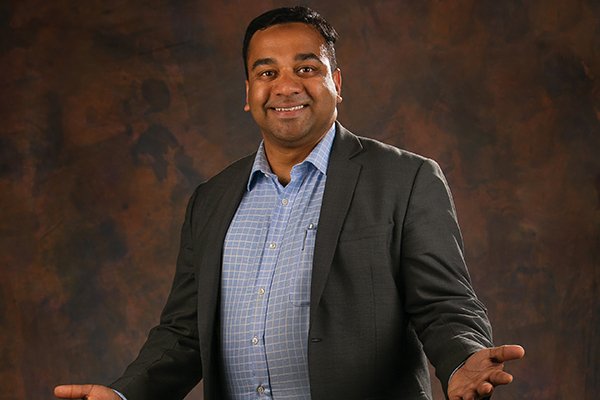Common charity
Assistant professor of management Sabith Khan sees answers to American problems in our acts of generosity.
Politics has Americans divided. You’ve said that giving, on the other hand, is a force that can bring us together. How is that?
Shared, common understandings of the public good are pretty hard to achieve. There have to be local and national conversations about that. What is the common good? I think this is what Americans are struggling with.
For instance, we could come to a common understanding at the local or national level that we’ve got to address poverty. That we’ve got to address it through the values and means of a religious framework, no matter what that is. We could say, It’s OK to feed the homeless and the hungry even if we think they’re lazy. We could come to some understandings like that without pointing fingers. I think that would be a first step.
And then we all pitch in money?
I use words like charity and giving very broadly. It could be volunteering, giving money, supporting people, writing petitions, whatever. Philanthropy can be defined as “voluntary action for common good.”
Anything that helps?
I think so. We’re talking about common understandings of what is good. I’m not describing any political or policy angles here.
It seems like you want giving to be nonpolitical and nonpartisan. Is it really like that?
There’s nothing negative about giving unless it’s for these mega-super-PACs or for political reasons that are controversial, whether that’s on the right or the left. You can question a million-dollar donation, but usually not me and you giving checks of $50 or $100.
One instance of large giving that I think is very American is Andrew Carnegie and the way he set up public libraries. Fantastic, right? Nobody could argue against that. Would you?
I love libraries.
I love them, too. A lot of people spend so much time there, and they are educational centers in their own right.
So that to me is cool. I wouldn’t argue against that. Set up a thousand more libraries. That is a perfect model to me: spending toward a greater good that benefits everybody.
Should we be doing more to promote giving?
I don’t think Americans need to be pushed to give more. It’s in the air. It’s here on campus, it’s in the church, mosque or synagogue or wherever you go. The numbers speak for themselves: $330 or $360 billion is not a small chunk of change. About a third of that giving every year by Americans goes to religious institutions.
You’ve written that giving is “the quintessential American value.”
If there is one civic value that Americans express the most, it is philanthropy. More Americans donate to charity than vote or even go to church on a regular basis.
The way it’s publicly acknowledged also makes it a very American thing. There is a strong culture of volunteering, starting from middle school at least.
Why did you start studying giving and nonprofits?
I fell into it. But maybe also because of my background. My mother was extremely generous. My parents were high school teachers in Bangalore; both of them taught in public schools their entire lives. We had a lot of students who’d come to our home for free lessons, who were struggling. My parents would spend enormous amounts of their free time doing this voluntarily. They didn’t call this volunteering, charity or philanthropy; in other cultures, people might do the act but not use the word.
I saw that this was not just a nice thing, but also a meaningful thing to do for these kids, many of whom were from destitute families.
A reminder that you don’t need great wealth to make a difference.
In a way everybody is a philanthropist. You have time to give. All of us have some resources to give. It could be our time or our attention to a specific issue. It could be our own presence in some cases. Just showing up to the town hall meeting, you could be the loudest voice there and that could actually make a difference.
Sabith Khan, who has a PhD in planning, governance and globalization from Virginia Tech, co-authored the 2017 book Islamic Education in the United States and the Evolution of Muslim Nonprofit Institutions. His current projects include a look at the role of nonprofits in refugee resettlement in the U.S. and a forthcoming book on international remittances. He is a board member of the Community Impact Fund, a Washington-based community foundation.
